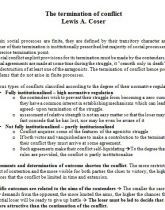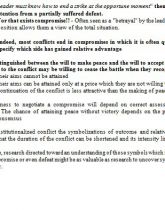Studijní materiál: Lewis A. Coser - The termination of conflict
Skrýt detaily | Oblíbený- Kvalita:77,0 %
- Typ:Studijní materiál
- Univerzita:Univerzita Karlova v Praze
- Fakulta:Fakulta sociálních věd
- Kategorie:Humanitní vědy
- Podkategorie:Politologie
- Předmět:Mezinárodní vztahy
- Autor:clean.bandit
- Ročník:3. ročník
- Rozsah A4:2 strán
- Zobrazeno:719 x
- Stažené:0 x
- Velikost:0,1 MB
- Formát a přípona:MS Office Word (.doc)
- Jazyk:český
- ID projektu:9426
- Poslední úprava:16.01.2017
Certain social processes are finite, they are defined by their transitory character and the manner of their termination is institutionally prescribed.but majority of social processes have no precise termination point.
In social conflict explicit provisions for its termination must be made by the contenders. If no mutual agreements are made at some time during the struggle, it "ceaseth only in death" or in total destruction of at least one of the antagonists. The termination of conflict hence presents problems that do not arise in finite processes.
Various types of conflicts classified according to the degree of their normative regulation:
» Fully institutionalized - high normative regulation
o the contenders wish to prevent their struggle from becoming a zero sum game they have a common interest in establishing mechanisms which can lead to an agreed- upon termination of the struggle.
o assessment of relative strength is not an easy matter so that the loser may not in fact concede that he has lost, nor may he even be aware of it
» Not fully institutionalized - partly institucionalized
o Conflict acquires some of the features of the agonistic struggle
o If both victor and vanquished are to make a contribution to the termination of their conflict they must arrive at some agreement.
o Such agreements make their conflict self-liquidating » To the degree that such rules are provided, the conflict is partly institutionalize
In social conflict explicit provisions for its termination must be made by the contenders. If no mutual agreements are made at some time during the struggle, it "ceaseth only in death" or in total destruction of at least one of the antagonists. The termination of conflict hence presents problems that do not arise in finite processes.
Various types of conflicts classified according to the degree of their normative regulation:
» Fully institutionalized - high normative regulation
o the contenders wish to prevent their struggle from becoming a zero sum game they have a common interest in establishing mechanisms which can lead to an agreed- upon termination of the struggle.
o assessment of relative strength is not an easy matter so that the loser may not in fact concede that he has lost, nor may he even be aware of it
» Not fully institutionalized - partly institucionalized
o Conflict acquires some of the features of the agonistic struggle
o If both victor and vanquished are to make a contribution to the termination of their conflict they must arrive at some agreement.
o Such agreements make their conflict self-liquidating » To the degree that such rules are provided, the conflict is partly institutionalize


